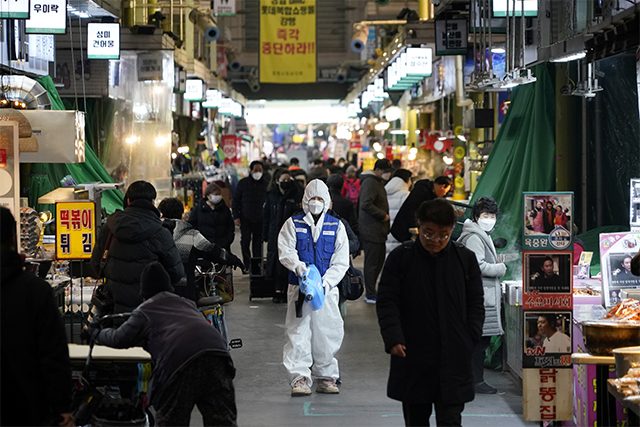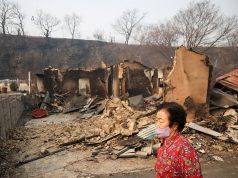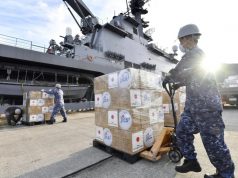
* Investors flee to safety as virus spreads outside China
* South Korea reports 161 new cases, 7th death
* WHO most concerned about cases with no China link
* Trains between Italy and Austria resume
SEOUL/SHANGHAI— Fears grew on Monday that the coronavirus outbreak in China will grow into a pandemic with disruptive and deadly consequences for countries around the world, after sharp rises in infections in South Korea, Italy and Iran.
A surge of infections in South Korea and Italy, and an alarming rise in the death toll in Iran over the weekend, triggered steep falls in Asian share markets and Wall Street stock futures on Monday as investors fled to safe havens such as gold.
Shares and oil prices tumbled while gold soared to a seven-year high. The Korean won fell 0.8% to its lowest since August.
“The news flow from the weekend has changed the game somewhat, where the focus is much more on the threat of an outbreak outside of China,” said Chris Weston, head of research at broker Pepperstone.
French Health Minister Olivier Veran said he would talk with his European counterparts soon to discuss how best to cope with a possible epidemic in Europe, after a third person died from the flu-like virus in Italy and the number of cases there jumped to more than 150 from just three before Friday.
“Tonight there is no epidemic in France. But there is a problematic situation at the door, in Italy, that we are watching with great attention,” Veran told a news conference.
Italy sealed off the worst-affected towns and banned public gatherings in much of the north, including halting the carnival in Venice, where there were two cases, to try to contain the biggest outbreak in Europe.
“I was surprised by this explosion of cases,” Italian Prime Minister Giuseppe Conte told state broadcaster RAI, warning numbers would likely rise in the coming days. “We will do everything we can to contain the contagion.”
Almost a dozen towns in Lombardy and Veneto with a combined population of some 50,000 have effectively been placed under quarantine as authorities struggled to find out how the outbreak started.
“If we cannot find ‘patient zero’ then it means the virus is even more ubiquitous than we thought,” said Luca Zaia, the regional governor of the wealthy Veneto region.
Austria suspended train services over the Alps from Italy for about four hours after two travelers showed symptoms of fever. The train carrying about 300 passengers from Venice, Italy, to Munich in Germany was allowed to continue its journey after the two tested negative for the new coronavirus.
Austrian Interior Minister Karl Nehammer said a coronavirus task force would meet on Monday to discuss whether to introduce border controls with Italy.
European Union Economic Affairs Commissioner Paolo Gentiloni said Brussels had confidence in the measures Italian authorities were taking and there was “no need to panic”.
In South Korea, authorities reported another 161 new cases on Monday, taking the total to 763. A seventh death was also reported.
Seoul raised its infectious disease alert to its highest level on Sunday after Daegu city and Cheongdo county – where infections surged last week – were designated “special care zones” on Friday.
The escalation in the alert level allows the government to send extra resources to Daegu and Cheongdo county, forcibly prevent public activities and order the temporary closure of schools, the health ministry said.
“The government will be all-out to minimise economic impact and make sure the recovery momentum would not be interrupted as we prepare for the worst-case scenario,” South Korean Vice Finance Minister Kim Yong-beom said on Monday.
“We’re closely monitoring (forex) markets in particular, and will take necessary steps if speculative trading leads to herd-like behaviours,” he added.
Iran, which announced its first two cases on Wednesday, said it had confirmed 43 cases and eight deaths, with most of the infections in the Shi’ite Muslim holy city of Qom.
Saudi Arabia, Kuwait, Iraq, Turkey and Afghanistan imposed travel and immigration restrictions on the Islamic Republic.
‘SEVERE AND COMPLEX’
The virus has killed 2,442 people in China, which has reported 76,936 cases, and has slammed the brakes on the world’s second-largest economy.
While more factories, businesses and construction sites are slowly reopening after an extended Lunar New Year holiday, the limited data available so far suggests manufacturing is still running at levels far below those in the same period last year.
The outbreak has spread to some 28 other countries and territories, with a death toll of around two dozen, according to a Reuters tally.
China reported 648 new infections on Sunday but only 18 were outside the epicentre of the outbreak in Hubei province, the lowest number outside the province since authorities began publishing data a month ago.
“At present, the epidemic situation is still severe and complex, and prevention and control work is in the most difficult and critical stage,” President Xi Jinping said.
Xi highlighted the importance of fighting the epidemic in the capital Beijing, which has recently required people arriving from elsewhere in China to be quarantined at home for 14 days.
He said it would have a relatively big, but short-term impact on the economy and that Beijing would step up policy adjustments to help cushion the blow.
The G20 grouping of the world’s top economies called on Saturday for a coordinated response to the coronavirus outbreak, which the IMF predicted would lower China’s growth this year to 5.6% and shave 0.1 percentage points from global growth.
In Japan, where the government is facing growing questions about whether it is doing enough to counter the virus, authorities had confirmed 773 cases by early Sunday evening.
Most of them were from a cruise ship quarantined near Tokyo, the Diamond Princess. A third passenger, a Japanese man in his 80s, died on Sunday.
British authorities said four people evacuated from the ship had tested positive for the virus after being flown to Britain.
(Reporting by Emily Chow in Shanghai and Jane Chung in Seoul; Additional reporting by Lushu Zhang in Beijing, Kevin Buckland in Tokyo, Parisa Hafezi in Dubai, Crispian Balmer in Rome and Kate Kelland in London, Tom Westbrook in Singapore and Cynthia Kim in Seoul; Writing by Stephen Coates; Editing by Lincoln Feast.)









